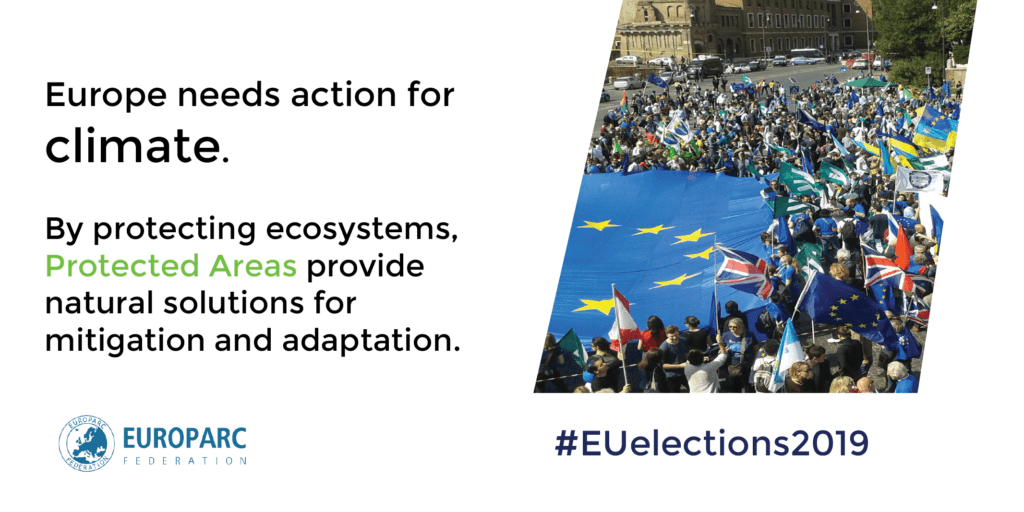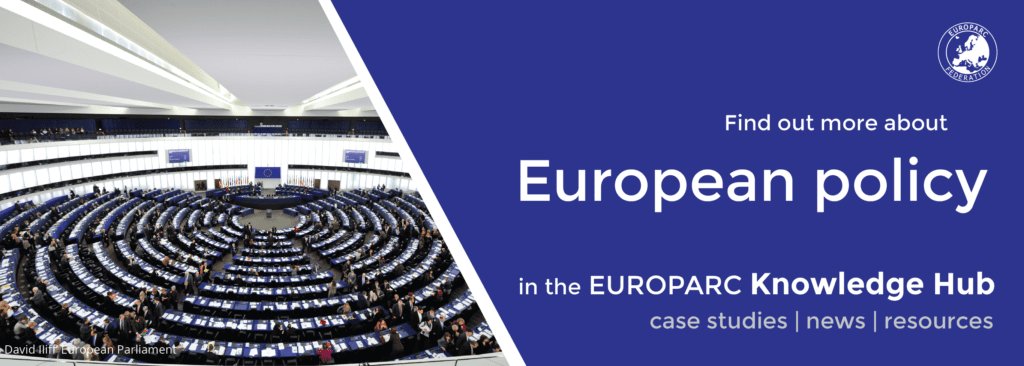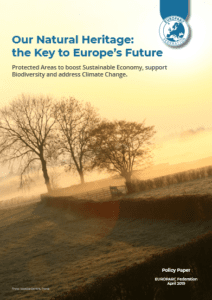EU Elections & Climate change: a call for Action in Brussels
article issued by Enzo Lavarra, EUROPARC Council Member and former Member of the European Parliament
Scientists from all over the world have been warning global political global decision-makers for decades about the risks of a general collapse of the “Earth system” due to climatic changes. That must constitute a fundamental compass towards a new paradigm of sustainable development.
The climate is now widely present in public perception and our common consciousness. The driving force behind this awareness is now revealing itself to be great and unprecedented: the global movement of “Greta Thunberg’s” generation, starting with the extraordinary initiative of the “Fridays for Future“.
The system of European parks and their most representative association, EUROPARC Federation, brings to this new perspective the baggage of its own experience and actions.
Around the key principle of nature and ecosystem protection, parks are implementing initiatives based on rigorous principles of ecological sustainability, on quality agriculture connected with the local culture and traditions, on intelligent tourism and not environmentally aggressive, on the enhancement and attention to the landscape, on the relationship, typically European, between environment, cultures and territories.

How are Parks contributing?
In mountain areas, parks promote policies dealing with melting glaciers and shrinking permafrost. In marine areas, they act on the protection of species, sustainable fishing and fight against invasion of plastic. Periurban and urban parks work to reinforce green belts and to create green and ecological cities. And for the rivers, parks are committed to improve water quality and make watercourses as real “life chains”.
Most of these initiatives are supported through European funds linked to EU programs and nature directives. And recently, the European Parliament has approved a report on cohesion policies which recognizes the role of protected natural areas in the fight against climate change.
For these reasons, the system of European parks associated with the EUROPARC Federation, calls to action all elected MEPs and their political representatives, in order to
consider climate change and sustainable development as a priority of the legislative action of the new Parliament, of the Commission, of the European Council.
EUROPARC Federation is committed to dialogue and to offer its contribution in order to:
1) Consolidate the “parks system” as promoters of a new way of thinking and on acting against climate change
2) Propose transnational, national and regional parks as stakeholders representing widespread interests, and as interlocutors for political decisions on sustainable development, quality of territories and landscape, social cohesion
3) Enhance protected areas’ contribution to ecosystem conservation. Ecosystems, as expressed also by the European Commission, produce positive values e.g. in supplying water and timber, in the regulation of water cycle, in cultural services (nature and landscape);
4) Recognize networks on Climate change that EUROPARC and its members intend to build with Universities, Foundations, Environmental associations, public and private bodies.
In this context, the Parks system, through its representation expressed in EUROPARC, intends to play a significant role as an educational, informative and communicational vehicle to obtain positive effects on the awareness of the problem and of the very tight timescale for acting. Parks can act both as amplifiers of the global alarm, as sources of correct information, and as forerunners of climate change adaption and mitigation.
EUROPARC’s Call to Action
WHAT WE ASK: Put Climate Policies high on the priority list, ensuring the integration of Nature Conservation in general, and valuing the role of Protected Areas in particular, in the EU Climate strategies and targets.
WHY? Europe needs action for climate. Protected Areas are key element to tackling climate change by protecting ecosystems, which provide natural solutions for mitigation and adaption. Ecosystems perform important services for society, such as climate regulation, carbon sequestration and storage, flood protection, water purification, water provision and soil erosion prevention.
To safeguard these fundamental services, resilient ecosystems are needed to cope with the impacts of climate change. To address climate challenges faced by European landscapes and biodiversity, EUROPARC is promoting habitats conservation and restoration, ensuring better resilience of ecosystems, and is raising capacity among managers to improve adaptation measures and planning in protected areas.
These and other measures at EUROPARC-EU-Natural-Heritage-Policy-Paper (also available in Italian and French)

